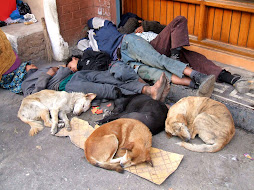
For the past five years, together with the International Primate Protection League and many other national and international partners, we have been fighting against the breeding and export of rhesus monkeys from Nepal to US research centres. It's been a long and sometimes difficult campaign. However, since 2007 we are supported by different European groups. They organise demonstrations at Nepalese embassies, write letters, hold discussions with government officials, etc. In September 2008 the government informed us that rhesus monkeys will not be exported for biomedical research. However, this decision does not have a legal basis and we worry that American agencies will conduct biomedical research in Nepal. The campaign continues until the captured monkeys have been released.
In Nepal, rhesus monkeys either co-habitat with humans as revered temple monkeys or live a tribal life deep in the high mountain forest. They are an integral part of the land's eco-system and culture and are worshipped by the Hindu population. However, commercial interests have led to the removal of monkeys from their natural environment. Instead of living a free life in temple compounds or in the jungle, some rhesus monkeys have been put behind bars. Here they undergo tests to benefit biomedical and possibly bio-terrorism research in the USA.
In 2003 Nepal allowed the breeding and export of rhesus monkeys for biomedical research. Two US primate centers, the Washington National Primate Research Center and South West National Primate Research Center, received a license through their Nepalese partners. As a coalition of national and international animal welfare organisations we firmly oppose this monkey business.
In 2003 Nepal allowed the breeding and export of rhesus monkeys for biomedical research. Two US primate centers, the Washington National Primate Research Center and South West National Primate Research Center, received a license through their Nepalese partners. As a coalition of national and international animal welfare organisations we firmly oppose this monkey business.
The government presently prepares a new Act which we expect will abolish the breeding of monkeys. We are however worried that in the future wildlife breeding will be reintroduced under stricter regulations.
Please join our fight against the misuse of Nepal’s precious primates!
Go to http://www.stopmonkeybusiness.org/ and get active!







